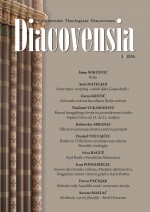CRKVA I »AUTONOMIJA ZEMALJSKIH STVARI« PREMA KONSTITUCIJI »GAUDIUM ET SPES«
THE CHURCH AND »THE AUTONOMY OF EARTHLY AFFAIRS« ACCORDING TO THE
CONSTITUTION »GAUDIUM ET SPES«
Author(s): Miljenko AničićSubject(s): Christian Theology and Religion, Constitutional Law, Religion and science , Politics and religion, Pastoral Theology, Sociology of Religion
Published by: Katolički bogoslovni fakultet u Đakovu
Keywords: Church; Gaudium et Spes; the autonomy of earthly affairs; science; culture; politics; lay person;
Summary/Abstract: Faced with numerous and profound social changes, in the Second Vatican Council the Church set for itself a task to once again raise awareness and show its members and the modern world the essence of Christian faith. The Pastoral Constitution »Gaudium et Spes« not only rejects the dualistic opposition of the Church and the world, but clearly highlights the Council’s opening of the Church to the world. Regarding the world, the Council offers a differentiated image with its positive and negative aspects and challenges. Gaudium et Spes calls one of these challenges »the autonomy of earthly affairs«. This article seeks to explore this for the modern man and the world important topic. The Council distinguishes between relative or legitimate and absolute or illegitimate autonomy. The discussion on this topic is much older and it goes back to the early centuries of Christianity, but it was not until the Second Vatican Council that it was adequately defined. To position this topic correctly it is necessary to consider both the Council’s image of man and of the world, and also to examine the ambivalence of the relationship between religion and the world, the Church and society. The autonomy of earthly affairs encompasses a wide range of human activities.
Journal: Diacovensia: teološki prilozi
- Issue Year: 21/2013
- Issue No: 3
- Page Range: 507-533
- Page Count: 27
- Language: Croatian

